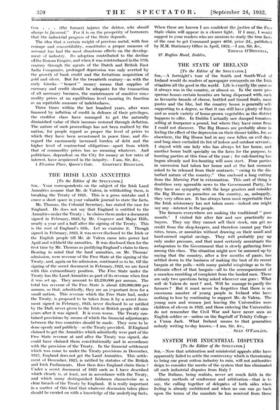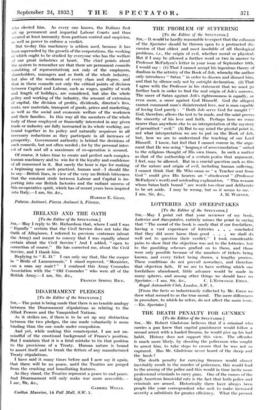SYSTEM FOR INDUSTRIAL DISPUTES
[To the Editor of the SPECTATORS] Sin,—Now that arbitration and ministerial. aluleals alike have apparently failed to settle the controversy which is threatening to bring our great cotton industry to ruin, will not authorities deign to consider the merits of the system that has eliminated all such industrial disputes from Italy ?
The Italians, being realists, never set much faith in the ordinary methods of conference and arbitration—that is to say, the calling together of delegates of both sides when feeling is already embittered and when no one can go back upon the terms of the mandate he has received from those
who elected him. As every one knows, the Italians first set up permanent and impartial Labour Courts and thus Secured at least immunity from partisan control and suspicion, as well as power to enforce a verdict.
But to-day this machinery is seldom used, because it has been superseded by the growth of the corporations, the working of which ought to be studied by everyone who has the welfare of our great industries at heart. The chief points about the system to remember are that there are permanent councils consisting of representatives not only of the employers, shareholders, managers and so forth of the whole industry, but also of the workmen of every class and degree, and that in these councils not only the critical points of division between Capital and Labour, such as wages, quality of work and length of holidays, are considered, but also the whole policy and working of the industry, the amount of extension of capital, the division of profits, dividends, director's fees, rents; raw materials, transport of goods, prices and Marketing, as well as the social and economic welfare of the workmen and their families. In this way all the members of the whole body of those employed or financially interested in any given trade or industry are fully instructed in its whole working, are bound together in its policy and naturally acquiesce in all necessary reductions as they participate in all increases of prosperity. Government authority is behind the decisions of such councils, but not often needed ; for by the personal inter- est of each and all a maximum of co-operation is secured.
Of course, it takes time to create and perfect such complex human machinery and to win for it the loyalty and confidence of all concerned in it. But surely the hour is ripe for making a beginning upon such practical, human and—I should like to say—British lines, in view of the very un-British bitterness that the constant strife between Labour and Capital is im- porting into our British factories and the radiant success of this co-operative spirit, which has of recent years been inspired into Italy.—I am, Sir, &c.,































 Previous page
Previous page